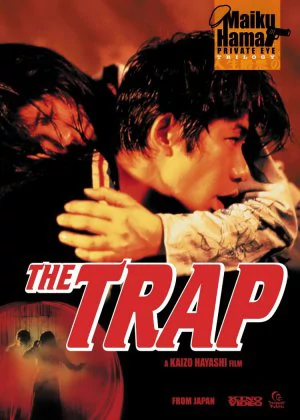Wana
Trap is the third and final part in the Hayashi directed Maiku Hama trilogy. Chances are that you've never heard about the films nor the director, which is definitely nothing to be ashamed of. Also, it might seem a little strange to review only part 3, but it does stick out as the best one in the series and the trilogy as a whole does deserve some extra attention.

Maiku Hama is a franchise that never really found its way to the West. Even though director Hayashi based his films on the once popular "Mike Hammer" detective series, it didn't help to raise an interest among Western audiences. He did his best to recapture the original noir feeling while flipping to an all Japanese setting, but even that couldn't woe them into watching his films.
The first entry in the series was filmed in milky-gray black and white, sporting a very typical soundtrack and a bandwagon of genre clichés. I'm not a big fan of the noir genre myself, so the fun of reviving the whole feel kinda went past me, but apart from that the first two films where pretty watchable. For completists, there's also a fourth instalment outside of Hayashi's trilogy, directed by none other than Shinji Aoyama. Still haven't seen that one though so I'm not quite sure how it relates to Hayashi's films.
Compared to its predecessors, Trap is a stronger film on all fronts. Though the noir feel is still very much present, Hayashi succeeds in making a tighter film, blending the humor and tension to a better whole, without either side detracting from each other. Central to the film is Nagase's performance. One of Japan's best modern actors and simply born to play a cool guy like Hama. It doesn't matter that he drives a ridiculous car or wears silly shirts, Nagase can keep his cool at all times. This third film sees him in a double role, resulting in a rather disturbing experience. Not only does he take the role of Maiku Hama (the good guy), but he also plays a retarded reject (the bad guy). Those who know the background story of the Hama saga will see the similarities between both characters, the ending also seems to suggest there is more than meets the eye, but it remains a strange experience to see an actor play against himself in a serious context. Still, Nagase pulls it off as if he's done it a million times already and lays down two very strong performances.

In Wana things are finally looking up for Hama. After his triumph in part 2 he's gained some fame, cash, and more importantly, a girlfriend. Sadly, those good times are short-lived as a serial killer enters town and gets Hama framed around halfway through the film. Hama is forced to retreat, burdening his friends, relatives and one gullible cop with the task to free him from suspicion. The film follows a typical story arc where the mystery is slowly unraveled, with the main twist nicely left in the sleeves of the director until the very end. Hayashi makes it work by keeping the lighter bits outside of the main story, letting the film itself be rather dense and dark, a decision that pays off in the final scenes of the film. A noticeable change from the earlier films.
Visually, Hayashi's choices are also much bolder. He applies a range of heavy color filters and goes for a more contrasting look. Color becomes an important aspect in this third part, something sadly lacking from the first two films, spare a few standalone scenes. The editing too has become more in your face, with one sequence in particular standing out. It's nice to see Hayashi raising the visual level of the film, as it definitely increases the dense atmosphere, making the film tenser and aiding the noirish mystery feel of the film. The soundtrack is still a little stale and apart from the theme tune (which is slightly annoying) has little flavor to add. It's a shame, because with some extra attention there Hayashi could've turned this final part into a real stunner.

It's hard to recommend this film without prior knowledge of the previous films. It's not a straight sequel, but it helps if you're already familiar with Nagase's character and his background, as it does add a few extra (even though somewhat incomprehensible) layers to the film. Apart from that, I guess the film has enough merits to work on its own, with strong cinematography, great use of color and a compelling mystery. And of course, Nagase's double role is the cherry on the cake. A little more attention to the soundtrack and this would've been a truly unforgettable film, but as it stands, classic noir fans, fans of Asian cinema and Nagase fans in particular should try to pick this one up, as there is plenty of fun to derive from this series.
